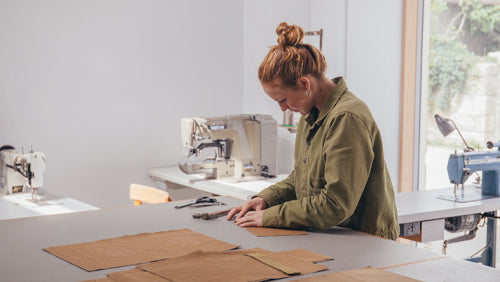We been asked a lot recently what advice we’d give to anyone starting their own brand. Instead of keeping our answers for those few, we thought we’d share them incase they were helpful to anyone else who’s just starting out.
1, Start out as a side project
Starting on the side while having another job means you won’t put too much pressure on your project from Day 1. Don’t ask too much of it at the beginning.
You wouldn’t ask your new born to start paying rent would you?
Having a reliable income stream while starting out means you’ll be freer in your decision making. Doing this especially in the early days meant we could make decisions based on creativity instead of finances.
2, Stop comparing yourself to others
When you’re starting out you’ll probably be tempted to look at all the businesses and brands out there for inspiration. It’s fine to reference them, but don’t compare yourself to them (or copy them).
If you compare yourself to others you’ll quickly become disheartened just because they appear more popular / bigger / have a team / have budgets etc. But they might have 5, 10 or 20 years on you. You’ve got ideas.
Google: ‘The Gap by Ira Glass.
3, You don’t have to invent something groundbreaking.
The pressure to create something entirely new and groundbreaking can stop you before you’ve even started. Ever noticed that everything new is just an iteration of what came before?
Don’t feel the pressure that you have to come up with a groundbreaking new invention. You can innovate the product by connecting dots that hadn’t been done before, or you can innovate the systems or business model within an industry.
4, But you do have to be different
It’s a very busy world so you have to bring a new and different approach so people will stop and listen. If you just follow what has already been done, you’ll blend in.
Your difference can come from anything;
- The people you choose to serve- What you make
- How to make it
- Your tone of voice or brand identity
5, Consider the environment and choose where you can have the most impact
We’ve got to ground our decision making with the environment in mind. Don’t create more stuff that people don’t need. Rather than be intimidated by the scale of the problem, be conscious of how you can operate better than most. Look at the problems in your industry and decide on where you can make most difference.
*Further reading: The Responsible Company by Yvon Chouinard
6, Fund it yourself
Save for it. You probably need less to start that you might think, be frugal and decide where your savings can have most impact. For example, we chose to invest in sampling and product development instead of working with branding agencies.
We started Paynter by both putting in £5,000 that we’d saved over years working at other jobs. Learning to save and handle your money well before you start a business will pay off in the long run. It also means you don’t owe anyone anything and have total control of what you’re building and the decisions you make.
7, Go work for someone else
It may sound odd, and the opposite of what you want to hear, but if you have an idea for an industry you’ve never worked in, you should go and learn from small to medium sized company who are doing something similar to what you want to do. Not only will you get paid to learn about the industry and how it works, but if it’s a small company, that’s even better because you’ll get involved in every aspect of the business and learn how to grow it over time.
Make no mistake you are there to add value to that business, it is not a short-cut. Make yourself valued and indispensable and you may even uncover your business idea whilst working there.
It’ll give you a taste of what running a business is like, and if it’s even for you before you decide to commit.
8, Don’t go it alone
If you can, find someone to start and run your business with. Choose them because your attitudes, values and goals align. You can both learn skills later.
When times get tough, make sure you can look after each other and don’t drive each other mad.
9, Be a generalist
By generalist, we mean it’s better to be good and open minded to work on all areas of the business from design and product to customer service and logistics, as well as accounting. Later you can specialise, but you’ll be surprised how much plate spinning you’ll have to do in the earliest of days.
Oh, and if you can do an accounting short course, you won’t regret it. It might just save you.



